Strategic Management and Corporate Strategy in Hospitality Sector
VerifiedAdded on 2023/06/11
|10
|3818
|358
Essay
AI Summary
This essay provides an overview of strategic management and corporate strategy within the hospitality sector. It highlights the importance of strategic management in achieving business goals, especially in the rapidly growing tourism and hospitality industry. The essay discusses key components of corporate strategy, including vision, goal setting, resource allocation, and activity prioritization, while referencing Porter's Five Forces model to analyze competitive dynamics. It also covers the strategic management process, emphasizing brand value creation, customer value maximization, and operational excellence. The essay further explores the formulation of corporate strategy, emphasizing the need to understand market competition and effectively manage company resources to achieve competitive advantages. Real-world examples, such as Marriott and Hyatt hotels, are used to illustrate these concepts. The essay concludes by stressing the importance of identifying micro-environmental factors and aligning strategies with customer needs to enhance business performance in the hospitality industry. Desklib provides access to this and other solved assignments.
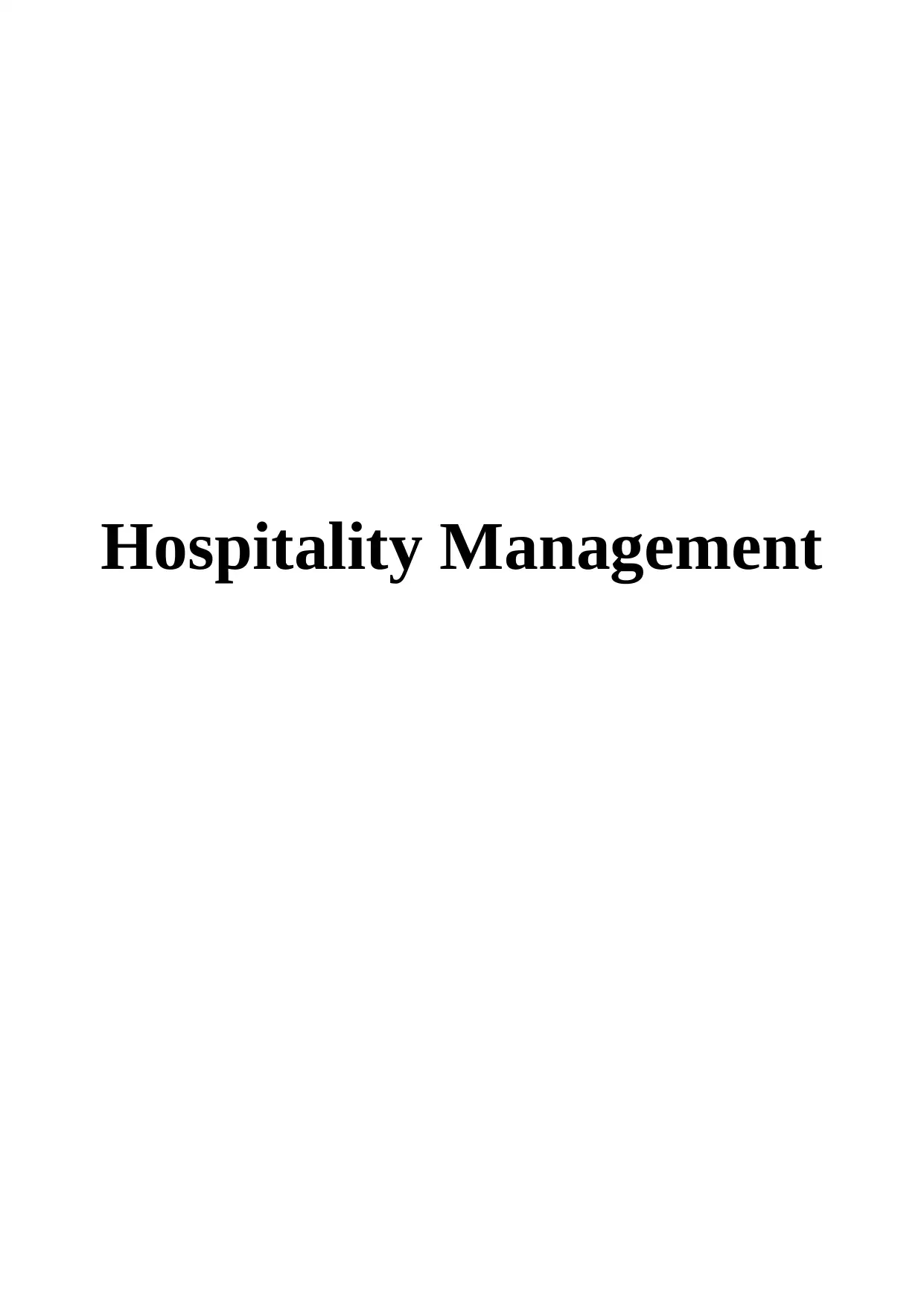
Hospitality Management
Paraphrase This Document
Need a fresh take? Get an instant paraphrase of this document with our AI Paraphraser
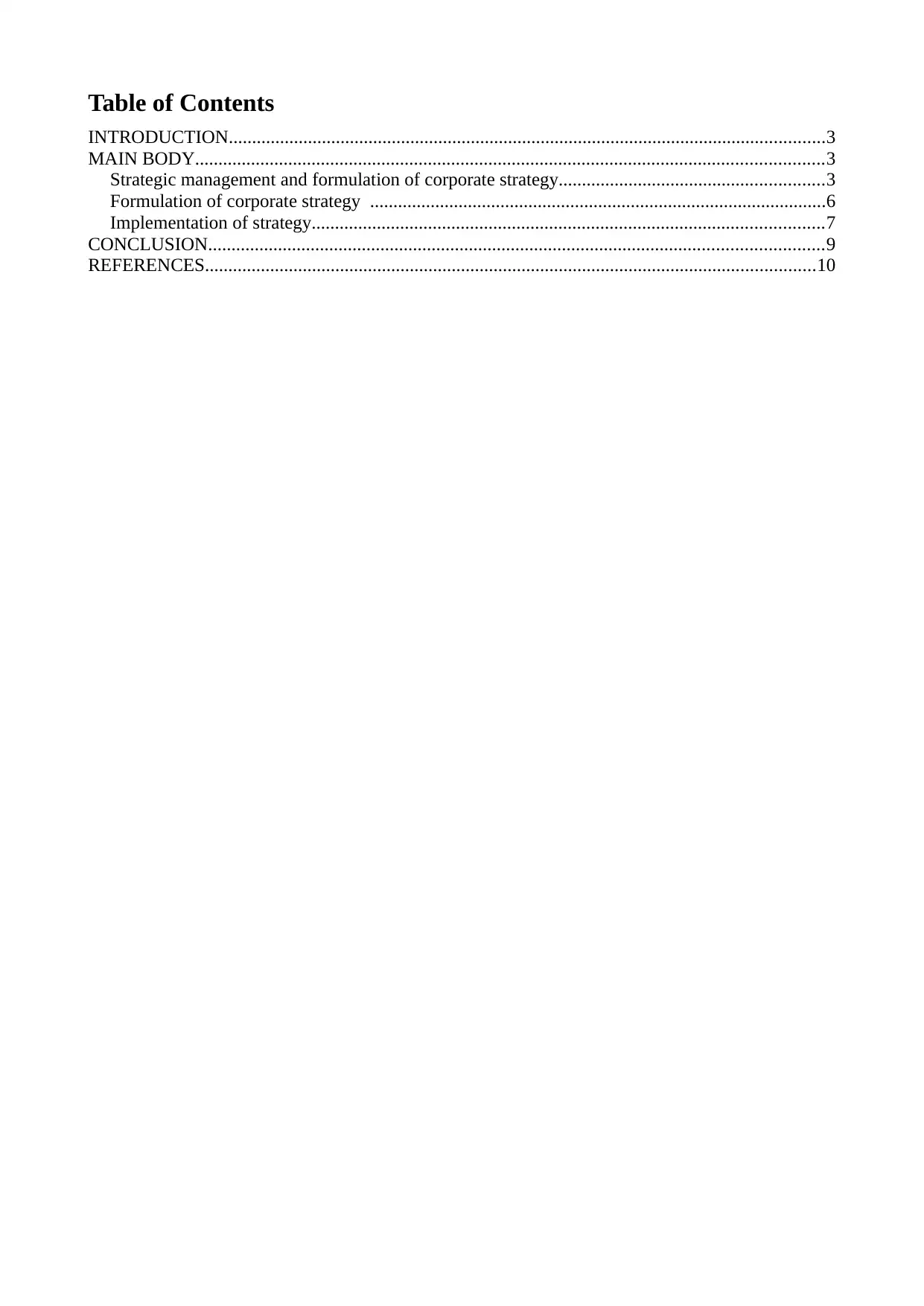
Table of Contents
INTRODUCTION................................................................................................................................3
MAIN BODY.......................................................................................................................................3
Strategic management and formulation of corporate strategy.........................................................3
Formulation of corporate strategy ..................................................................................................6
Implementation of strategy..............................................................................................................7
CONCLUSION....................................................................................................................................9
REFERENCES...................................................................................................................................10
INTRODUCTION................................................................................................................................3
MAIN BODY.......................................................................................................................................3
Strategic management and formulation of corporate strategy.........................................................3
Formulation of corporate strategy ..................................................................................................6
Implementation of strategy..............................................................................................................7
CONCLUSION....................................................................................................................................9
REFERENCES...................................................................................................................................10
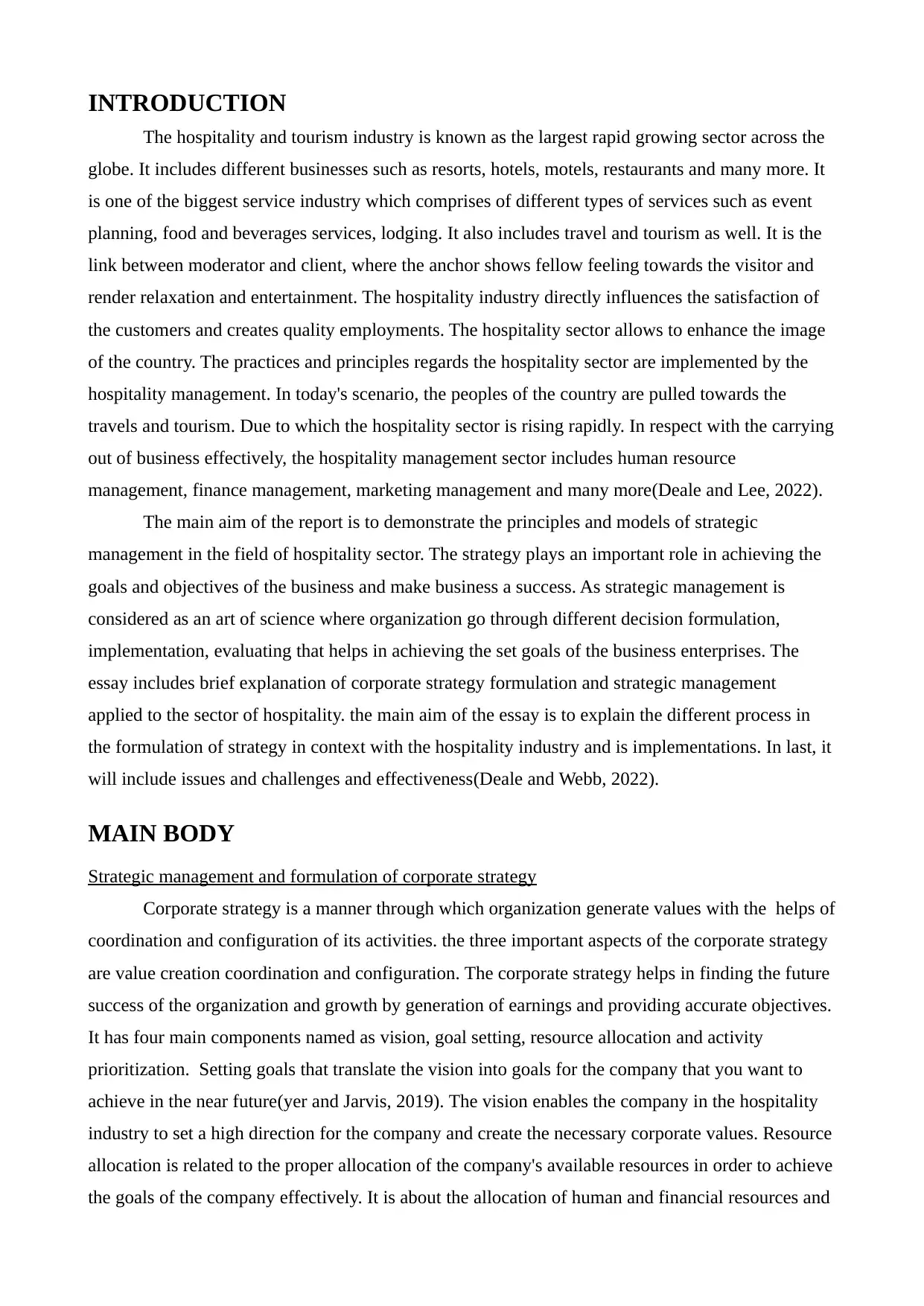
INTRODUCTION
The hospitality and tourism industry is known as the largest rapid growing sector across the
globe. It includes different businesses such as resorts, hotels, motels, restaurants and many more. It
is one of the biggest service industry which comprises of different types of services such as event
planning, food and beverages services, lodging. It also includes travel and tourism as well. It is the
link between moderator and client, where the anchor shows fellow feeling towards the visitor and
render relaxation and entertainment. The hospitality industry directly influences the satisfaction of
the customers and creates quality employments. The hospitality sector allows to enhance the image
of the country. The practices and principles regards the hospitality sector are implemented by the
hospitality management. In today's scenario, the peoples of the country are pulled towards the
travels and tourism. Due to which the hospitality sector is rising rapidly. In respect with the carrying
out of business effectively, the hospitality management sector includes human resource
management, finance management, marketing management and many more(Deale and Lee, 2022).
The main aim of the report is to demonstrate the principles and models of strategic
management in the field of hospitality sector. The strategy plays an important role in achieving the
goals and objectives of the business and make business a success. As strategic management is
considered as an art of science where organization go through different decision formulation,
implementation, evaluating that helps in achieving the set goals of the business enterprises. The
essay includes brief explanation of corporate strategy formulation and strategic management
applied to the sector of hospitality. the main aim of the essay is to explain the different process in
the formulation of strategy in context with the hospitality industry and is implementations. In last, it
will include issues and challenges and effectiveness(Deale and Webb, 2022).
MAIN BODY
Strategic management and formulation of corporate strategy
Corporate strategy is a manner through which organization generate values with the helps of
coordination and configuration of its activities. the three important aspects of the corporate strategy
are value creation coordination and configuration. The corporate strategy helps in finding the future
success of the organization and growth by generation of earnings and providing accurate objectives.
It has four main components named as vision, goal setting, resource allocation and activity
prioritization. Setting goals that translate the vision into goals for the company that you want to
achieve in the near future(yer and Jarvis, 2019). The vision enables the company in the hospitality
industry to set a high direction for the company and create the necessary corporate values. Resource
allocation is related to the proper allocation of the company's available resources in order to achieve
the goals of the company effectively. It is about the allocation of human and financial resources and
The hospitality and tourism industry is known as the largest rapid growing sector across the
globe. It includes different businesses such as resorts, hotels, motels, restaurants and many more. It
is one of the biggest service industry which comprises of different types of services such as event
planning, food and beverages services, lodging. It also includes travel and tourism as well. It is the
link between moderator and client, where the anchor shows fellow feeling towards the visitor and
render relaxation and entertainment. The hospitality industry directly influences the satisfaction of
the customers and creates quality employments. The hospitality sector allows to enhance the image
of the country. The practices and principles regards the hospitality sector are implemented by the
hospitality management. In today's scenario, the peoples of the country are pulled towards the
travels and tourism. Due to which the hospitality sector is rising rapidly. In respect with the carrying
out of business effectively, the hospitality management sector includes human resource
management, finance management, marketing management and many more(Deale and Lee, 2022).
The main aim of the report is to demonstrate the principles and models of strategic
management in the field of hospitality sector. The strategy plays an important role in achieving the
goals and objectives of the business and make business a success. As strategic management is
considered as an art of science where organization go through different decision formulation,
implementation, evaluating that helps in achieving the set goals of the business enterprises. The
essay includes brief explanation of corporate strategy formulation and strategic management
applied to the sector of hospitality. the main aim of the essay is to explain the different process in
the formulation of strategy in context with the hospitality industry and is implementations. In last, it
will include issues and challenges and effectiveness(Deale and Webb, 2022).
MAIN BODY
Strategic management and formulation of corporate strategy
Corporate strategy is a manner through which organization generate values with the helps of
coordination and configuration of its activities. the three important aspects of the corporate strategy
are value creation coordination and configuration. The corporate strategy helps in finding the future
success of the organization and growth by generation of earnings and providing accurate objectives.
It has four main components named as vision, goal setting, resource allocation and activity
prioritization. Setting goals that translate the vision into goals for the company that you want to
achieve in the near future(yer and Jarvis, 2019). The vision enables the company in the hospitality
industry to set a high direction for the company and create the necessary corporate values. Resource
allocation is related to the proper allocation of the company's available resources in order to achieve
the goals of the company effectively. It is about the allocation of human and financial resources and
⊘ This is a preview!⊘
Do you want full access?
Subscribe today to unlock all pages.

Trusted by 1+ million students worldwide
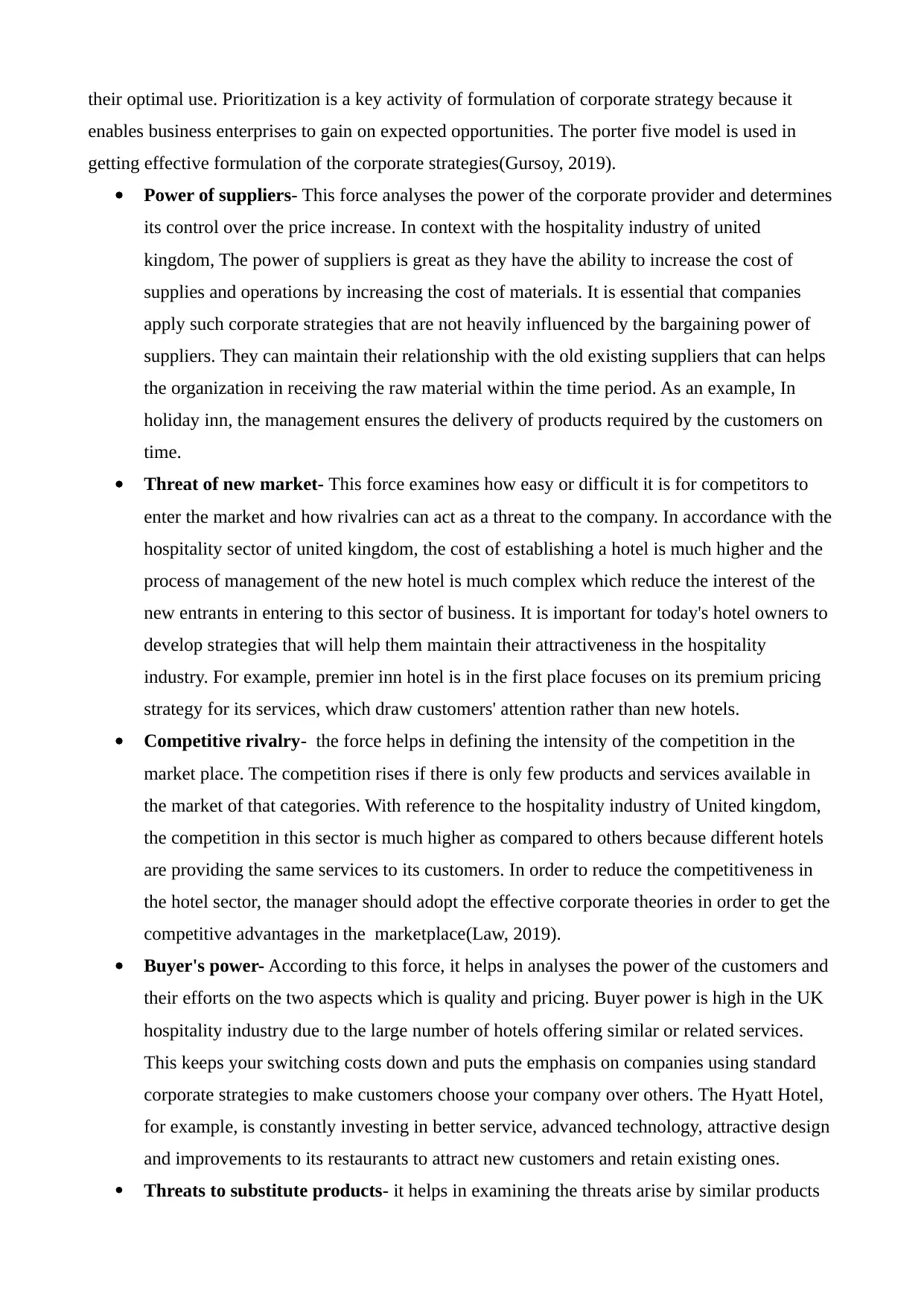
their optimal use. Prioritization is a key activity of formulation of corporate strategy because it
enables business enterprises to gain on expected opportunities. The porter five model is used in
getting effective formulation of the corporate strategies(Gursoy, 2019).
Power of suppliers- This force analyses the power of the corporate provider and determines
its control over the price increase. In context with the hospitality industry of united
kingdom, The power of suppliers is great as they have the ability to increase the cost of
supplies and operations by increasing the cost of materials. It is essential that companies
apply such corporate strategies that are not heavily influenced by the bargaining power of
suppliers. They can maintain their relationship with the old existing suppliers that can helps
the organization in receiving the raw material within the time period. As an example, In
holiday inn, the management ensures the delivery of products required by the customers on
time.
Threat of new market- This force examines how easy or difficult it is for competitors to
enter the market and how rivalries can act as a threat to the company. In accordance with the
hospitality sector of united kingdom, the cost of establishing a hotel is much higher and the
process of management of the new hotel is much complex which reduce the interest of the
new entrants in entering to this sector of business. It is important for today's hotel owners to
develop strategies that will help them maintain their attractiveness in the hospitality
industry. For example, premier inn hotel is in the first place focuses on its premium pricing
strategy for its services, which draw customers' attention rather than new hotels.
Competitive rivalry- the force helps in defining the intensity of the competition in the
market place. The competition rises if there is only few products and services available in
the market of that categories. With reference to the hospitality industry of United kingdom,
the competition in this sector is much higher as compared to others because different hotels
are providing the same services to its customers. In order to reduce the competitiveness in
the hotel sector, the manager should adopt the effective corporate theories in order to get the
competitive advantages in the marketplace(Law, 2019).
Buyer's power- According to this force, it helps in analyses the power of the customers and
their efforts on the two aspects which is quality and pricing. Buyer power is high in the UK
hospitality industry due to the large number of hotels offering similar or related services.
This keeps your switching costs down and puts the emphasis on companies using standard
corporate strategies to make customers choose your company over others. The Hyatt Hotel,
for example, is constantly investing in better service, advanced technology, attractive design
and improvements to its restaurants to attract new customers and retain existing ones.
Threats to substitute products- it helps in examining the threats arise by similar products
enables business enterprises to gain on expected opportunities. The porter five model is used in
getting effective formulation of the corporate strategies(Gursoy, 2019).
Power of suppliers- This force analyses the power of the corporate provider and determines
its control over the price increase. In context with the hospitality industry of united
kingdom, The power of suppliers is great as they have the ability to increase the cost of
supplies and operations by increasing the cost of materials. It is essential that companies
apply such corporate strategies that are not heavily influenced by the bargaining power of
suppliers. They can maintain their relationship with the old existing suppliers that can helps
the organization in receiving the raw material within the time period. As an example, In
holiday inn, the management ensures the delivery of products required by the customers on
time.
Threat of new market- This force examines how easy or difficult it is for competitors to
enter the market and how rivalries can act as a threat to the company. In accordance with the
hospitality sector of united kingdom, the cost of establishing a hotel is much higher and the
process of management of the new hotel is much complex which reduce the interest of the
new entrants in entering to this sector of business. It is important for today's hotel owners to
develop strategies that will help them maintain their attractiveness in the hospitality
industry. For example, premier inn hotel is in the first place focuses on its premium pricing
strategy for its services, which draw customers' attention rather than new hotels.
Competitive rivalry- the force helps in defining the intensity of the competition in the
market place. The competition rises if there is only few products and services available in
the market of that categories. With reference to the hospitality industry of United kingdom,
the competition in this sector is much higher as compared to others because different hotels
are providing the same services to its customers. In order to reduce the competitiveness in
the hotel sector, the manager should adopt the effective corporate theories in order to get the
competitive advantages in the marketplace(Law, 2019).
Buyer's power- According to this force, it helps in analyses the power of the customers and
their efforts on the two aspects which is quality and pricing. Buyer power is high in the UK
hospitality industry due to the large number of hotels offering similar or related services.
This keeps your switching costs down and puts the emphasis on companies using standard
corporate strategies to make customers choose your company over others. The Hyatt Hotel,
for example, is constantly investing in better service, advanced technology, attractive design
and improvements to its restaurants to attract new customers and retain existing ones.
Threats to substitute products- it helps in examining the threats arise by similar products
Paraphrase This Document
Need a fresh take? Get an instant paraphrase of this document with our AI Paraphraser
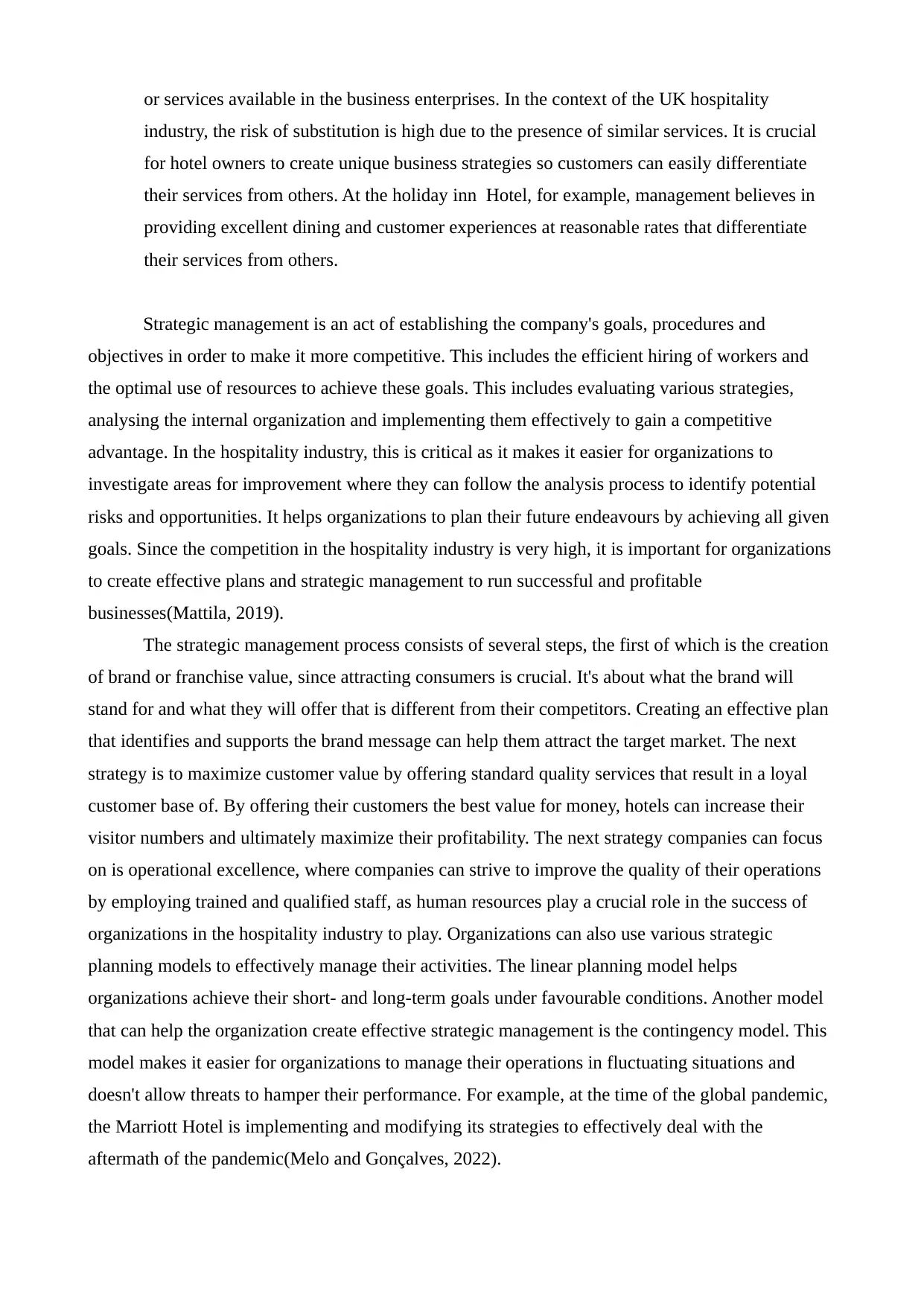
or services available in the business enterprises. In the context of the UK hospitality
industry, the risk of substitution is high due to the presence of similar services. It is crucial
for hotel owners to create unique business strategies so customers can easily differentiate
their services from others. At the holiday inn Hotel, for example, management believes in
providing excellent dining and customer experiences at reasonable rates that differentiate
their services from others.
Strategic management is an act of establishing the company's goals, procedures and
objectives in order to make it more competitive. This includes the efficient hiring of workers and
the optimal use of resources to achieve these goals. This includes evaluating various strategies,
analysing the internal organization and implementing them effectively to gain a competitive
advantage. In the hospitality industry, this is critical as it makes it easier for organizations to
investigate areas for improvement where they can follow the analysis process to identify potential
risks and opportunities. It helps organizations to plan their future endeavours by achieving all given
goals. Since the competition in the hospitality industry is very high, it is important for organizations
to create effective plans and strategic management to run successful and profitable
businesses(Mattila, 2019).
The strategic management process consists of several steps, the first of which is the creation
of brand or franchise value, since attracting consumers is crucial. It's about what the brand will
stand for and what they will offer that is different from their competitors. Creating an effective plan
that identifies and supports the brand message can help them attract the target market. The next
strategy is to maximize customer value by offering standard quality services that result in a loyal
customer base of. By offering their customers the best value for money, hotels can increase their
visitor numbers and ultimately maximize their profitability. The next strategy companies can focus
on is operational excellence, where companies can strive to improve the quality of their operations
by employing trained and qualified staff, as human resources play a crucial role in the success of
organizations in the hospitality industry to play. Organizations can also use various strategic
planning models to effectively manage their activities. The linear planning model helps
organizations achieve their short- and long-term goals under favourable conditions. Another model
that can help the organization create effective strategic management is the contingency model. This
model makes it easier for organizations to manage their operations in fluctuating situations and
doesn't allow threats to hamper their performance. For example, at the time of the global pandemic,
the Marriott Hotel is implementing and modifying its strategies to effectively deal with the
aftermath of the pandemic(Melo and Gonçalves, 2022).
industry, the risk of substitution is high due to the presence of similar services. It is crucial
for hotel owners to create unique business strategies so customers can easily differentiate
their services from others. At the holiday inn Hotel, for example, management believes in
providing excellent dining and customer experiences at reasonable rates that differentiate
their services from others.
Strategic management is an act of establishing the company's goals, procedures and
objectives in order to make it more competitive. This includes the efficient hiring of workers and
the optimal use of resources to achieve these goals. This includes evaluating various strategies,
analysing the internal organization and implementing them effectively to gain a competitive
advantage. In the hospitality industry, this is critical as it makes it easier for organizations to
investigate areas for improvement where they can follow the analysis process to identify potential
risks and opportunities. It helps organizations to plan their future endeavours by achieving all given
goals. Since the competition in the hospitality industry is very high, it is important for organizations
to create effective plans and strategic management to run successful and profitable
businesses(Mattila, 2019).
The strategic management process consists of several steps, the first of which is the creation
of brand or franchise value, since attracting consumers is crucial. It's about what the brand will
stand for and what they will offer that is different from their competitors. Creating an effective plan
that identifies and supports the brand message can help them attract the target market. The next
strategy is to maximize customer value by offering standard quality services that result in a loyal
customer base of. By offering their customers the best value for money, hotels can increase their
visitor numbers and ultimately maximize their profitability. The next strategy companies can focus
on is operational excellence, where companies can strive to improve the quality of their operations
by employing trained and qualified staff, as human resources play a crucial role in the success of
organizations in the hospitality industry to play. Organizations can also use various strategic
planning models to effectively manage their activities. The linear planning model helps
organizations achieve their short- and long-term goals under favourable conditions. Another model
that can help the organization create effective strategic management is the contingency model. This
model makes it easier for organizations to manage their operations in fluctuating situations and
doesn't allow threats to hamper their performance. For example, at the time of the global pandemic,
the Marriott Hotel is implementing and modifying its strategies to effectively deal with the
aftermath of the pandemic(Melo and Gonçalves, 2022).
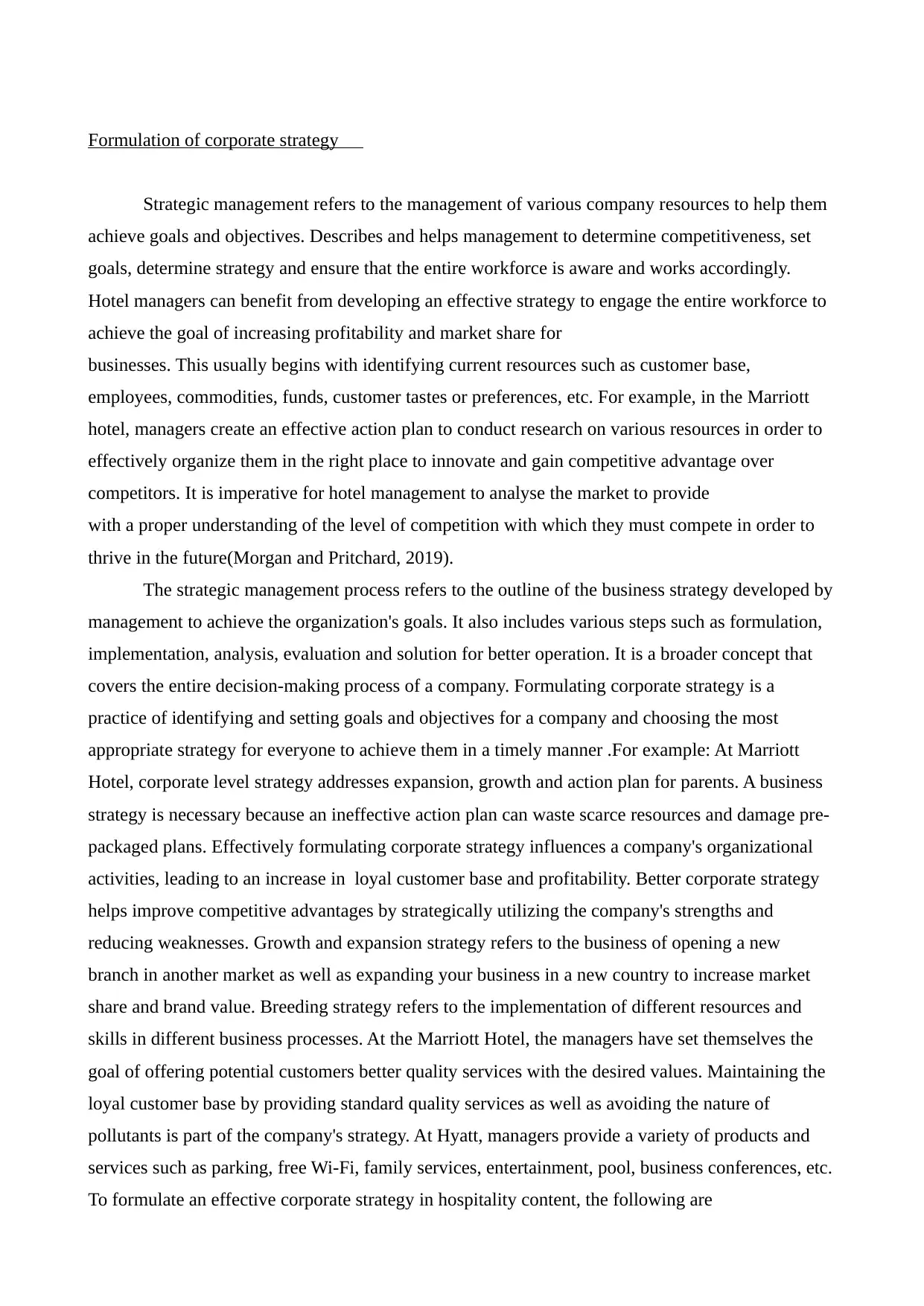
Formulation of corporate strategy
Strategic management refers to the management of various company resources to help them
achieve goals and objectives. Describes and helps management to determine competitiveness, set
goals, determine strategy and ensure that the entire workforce is aware and works accordingly.
Hotel managers can benefit from developing an effective strategy to engage the entire workforce to
achieve the goal of increasing profitability and market share for
businesses. This usually begins with identifying current resources such as customer base,
employees, commodities, funds, customer tastes or preferences, etc. For example, in the Marriott
hotel, managers create an effective action plan to conduct research on various resources in order to
effectively organize them in the right place to innovate and gain competitive advantage over
competitors. It is imperative for hotel management to analyse the market to provide
with a proper understanding of the level of competition with which they must compete in order to
thrive in the future(Morgan and Pritchard, 2019).
The strategic management process refers to the outline of the business strategy developed by
management to achieve the organization's goals. It also includes various steps such as formulation,
implementation, analysis, evaluation and solution for better operation. It is a broader concept that
covers the entire decision-making process of a company. Formulating corporate strategy is a
practice of identifying and setting goals and objectives for a company and choosing the most
appropriate strategy for everyone to achieve them in a timely manner .For example: At Marriott
Hotel, corporate level strategy addresses expansion, growth and action plan for parents. A business
strategy is necessary because an ineffective action plan can waste scarce resources and damage pre-
packaged plans. Effectively formulating corporate strategy influences a company's organizational
activities, leading to an increase in loyal customer base and profitability. Better corporate strategy
helps improve competitive advantages by strategically utilizing the company's strengths and
reducing weaknesses. Growth and expansion strategy refers to the business of opening a new
branch in another market as well as expanding your business in a new country to increase market
share and brand value. Breeding strategy refers to the implementation of different resources and
skills in different business processes. At the Marriott Hotel, the managers have set themselves the
goal of offering potential customers better quality services with the desired values. Maintaining the
loyal customer base by providing standard quality services as well as avoiding the nature of
pollutants is part of the company's strategy. At Hyatt, managers provide a variety of products and
services such as parking, free Wi-Fi, family services, entertainment, pool, business conferences, etc.
To formulate an effective corporate strategy in hospitality content, the following are
Strategic management refers to the management of various company resources to help them
achieve goals and objectives. Describes and helps management to determine competitiveness, set
goals, determine strategy and ensure that the entire workforce is aware and works accordingly.
Hotel managers can benefit from developing an effective strategy to engage the entire workforce to
achieve the goal of increasing profitability and market share for
businesses. This usually begins with identifying current resources such as customer base,
employees, commodities, funds, customer tastes or preferences, etc. For example, in the Marriott
hotel, managers create an effective action plan to conduct research on various resources in order to
effectively organize them in the right place to innovate and gain competitive advantage over
competitors. It is imperative for hotel management to analyse the market to provide
with a proper understanding of the level of competition with which they must compete in order to
thrive in the future(Morgan and Pritchard, 2019).
The strategic management process refers to the outline of the business strategy developed by
management to achieve the organization's goals. It also includes various steps such as formulation,
implementation, analysis, evaluation and solution for better operation. It is a broader concept that
covers the entire decision-making process of a company. Formulating corporate strategy is a
practice of identifying and setting goals and objectives for a company and choosing the most
appropriate strategy for everyone to achieve them in a timely manner .For example: At Marriott
Hotel, corporate level strategy addresses expansion, growth and action plan for parents. A business
strategy is necessary because an ineffective action plan can waste scarce resources and damage pre-
packaged plans. Effectively formulating corporate strategy influences a company's organizational
activities, leading to an increase in loyal customer base and profitability. Better corporate strategy
helps improve competitive advantages by strategically utilizing the company's strengths and
reducing weaknesses. Growth and expansion strategy refers to the business of opening a new
branch in another market as well as expanding your business in a new country to increase market
share and brand value. Breeding strategy refers to the implementation of different resources and
skills in different business processes. At the Marriott Hotel, the managers have set themselves the
goal of offering potential customers better quality services with the desired values. Maintaining the
loyal customer base by providing standard quality services as well as avoiding the nature of
pollutants is part of the company's strategy. At Hyatt, managers provide a variety of products and
services such as parking, free Wi-Fi, family services, entertainment, pool, business conferences, etc.
To formulate an effective corporate strategy in hospitality content, the following are
⊘ This is a preview!⊘
Do you want full access?
Subscribe today to unlock all pages.

Trusted by 1+ million students worldwide
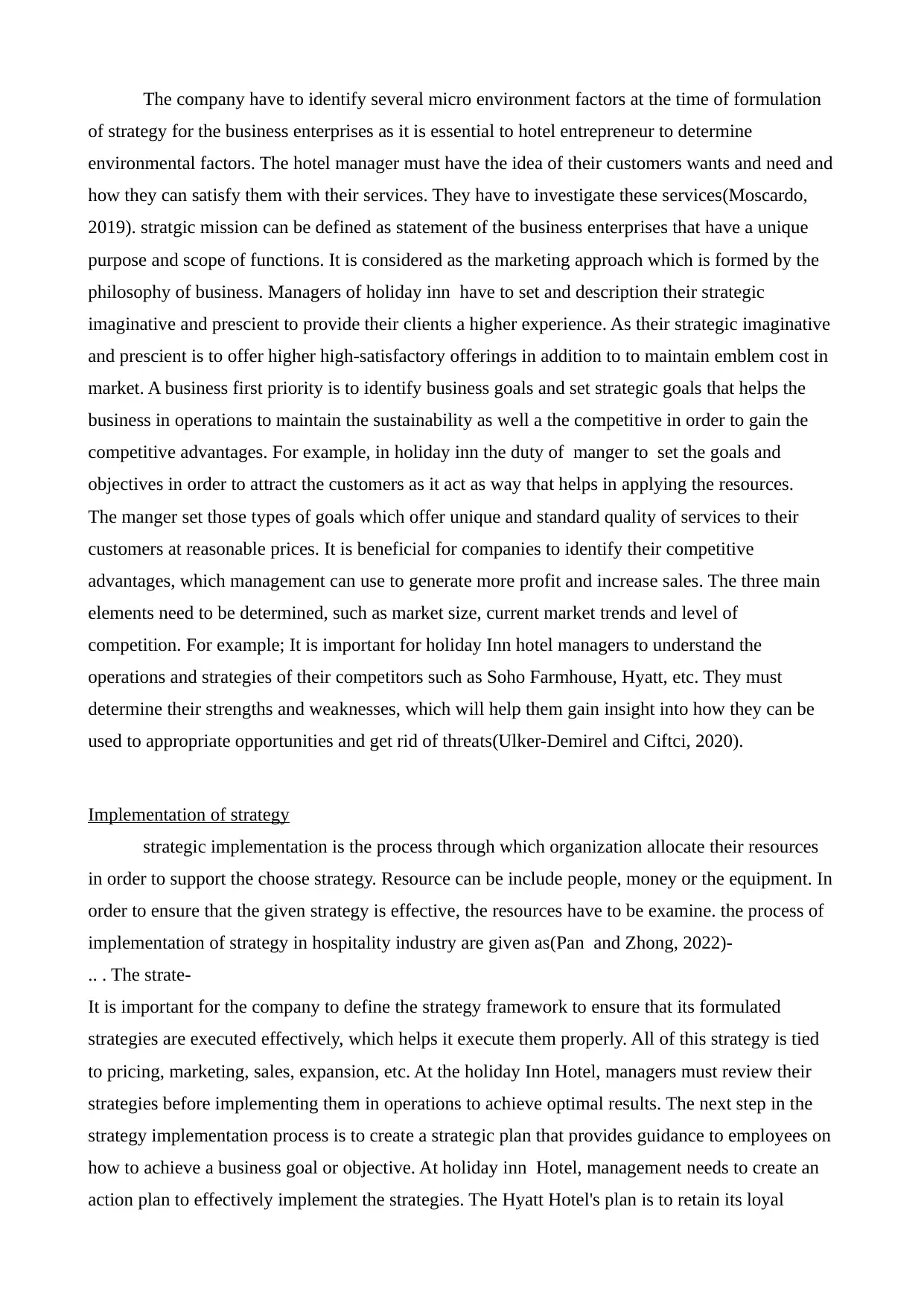
The company have to identify several micro environment factors at the time of formulation
of strategy for the business enterprises as it is essential to hotel entrepreneur to determine
environmental factors. The hotel manager must have the idea of their customers wants and need and
how they can satisfy them with their services. They have to investigate these services(Moscardo,
2019). stratgic mission can be defined as statement of the business enterprises that have a unique
purpose and scope of functions. It is considered as the marketing approach which is formed by the
philosophy of business. Managers of holiday inn have to set and description their strategic
imaginative and prescient to provide their clients a higher experience. As their strategic imaginative
and prescient is to offer higher high-satisfactory offerings in addition to to maintain emblem cost in
market. A business first priority is to identify business goals and set strategic goals that helps the
business in operations to maintain the sustainability as well a the competitive in order to gain the
competitive advantages. For example, in holiday inn the duty of manger to set the goals and
objectives in order to attract the customers as it act as way that helps in applying the resources.
The manger set those types of goals which offer unique and standard quality of services to their
customers at reasonable prices. It is beneficial for companies to identify their competitive
advantages, which management can use to generate more profit and increase sales. The three main
elements need to be determined, such as market size, current market trends and level of
competition. For example; It is important for holiday Inn hotel managers to understand the
operations and strategies of their competitors such as Soho Farmhouse, Hyatt, etc. They must
determine their strengths and weaknesses, which will help them gain insight into how they can be
used to appropriate opportunities and get rid of threats(Ulker-Demirel and Ciftci, 2020).
Implementation of strategy
strategic implementation is the process through which organization allocate their resources
in order to support the choose strategy. Resource can be include people, money or the equipment. In
order to ensure that the given strategy is effective, the resources have to be examine. the process of
implementation of strategy in hospitality industry are given as(Pan and Zhong, 2022)-
.. . The strate-
It is important for the company to define the strategy framework to ensure that its formulated
strategies are executed effectively, which helps it execute them properly. All of this strategy is tied
to pricing, marketing, sales, expansion, etc. At the holiday Inn Hotel, managers must review their
strategies before implementing them in operations to achieve optimal results. The next step in the
strategy implementation process is to create a strategic plan that provides guidance to employees on
how to achieve a business goal or objective. At holiday inn Hotel, management needs to create an
action plan to effectively implement the strategies. The Hyatt Hotel's plan is to retain its loyal
of strategy for the business enterprises as it is essential to hotel entrepreneur to determine
environmental factors. The hotel manager must have the idea of their customers wants and need and
how they can satisfy them with their services. They have to investigate these services(Moscardo,
2019). stratgic mission can be defined as statement of the business enterprises that have a unique
purpose and scope of functions. It is considered as the marketing approach which is formed by the
philosophy of business. Managers of holiday inn have to set and description their strategic
imaginative and prescient to provide their clients a higher experience. As their strategic imaginative
and prescient is to offer higher high-satisfactory offerings in addition to to maintain emblem cost in
market. A business first priority is to identify business goals and set strategic goals that helps the
business in operations to maintain the sustainability as well a the competitive in order to gain the
competitive advantages. For example, in holiday inn the duty of manger to set the goals and
objectives in order to attract the customers as it act as way that helps in applying the resources.
The manger set those types of goals which offer unique and standard quality of services to their
customers at reasonable prices. It is beneficial for companies to identify their competitive
advantages, which management can use to generate more profit and increase sales. The three main
elements need to be determined, such as market size, current market trends and level of
competition. For example; It is important for holiday Inn hotel managers to understand the
operations and strategies of their competitors such as Soho Farmhouse, Hyatt, etc. They must
determine their strengths and weaknesses, which will help them gain insight into how they can be
used to appropriate opportunities and get rid of threats(Ulker-Demirel and Ciftci, 2020).
Implementation of strategy
strategic implementation is the process through which organization allocate their resources
in order to support the choose strategy. Resource can be include people, money or the equipment. In
order to ensure that the given strategy is effective, the resources have to be examine. the process of
implementation of strategy in hospitality industry are given as(Pan and Zhong, 2022)-
.. . The strate-
It is important for the company to define the strategy framework to ensure that its formulated
strategies are executed effectively, which helps it execute them properly. All of this strategy is tied
to pricing, marketing, sales, expansion, etc. At the holiday Inn Hotel, managers must review their
strategies before implementing them in operations to achieve optimal results. The next step in the
strategy implementation process is to create a strategic plan that provides guidance to employees on
how to achieve a business goal or objective. At holiday inn Hotel, management needs to create an
action plan to effectively implement the strategies. The Hyatt Hotel's plan is to retain its loyal
Paraphrase This Document
Need a fresh take? Get an instant paraphrase of this document with our AI Paraphraser
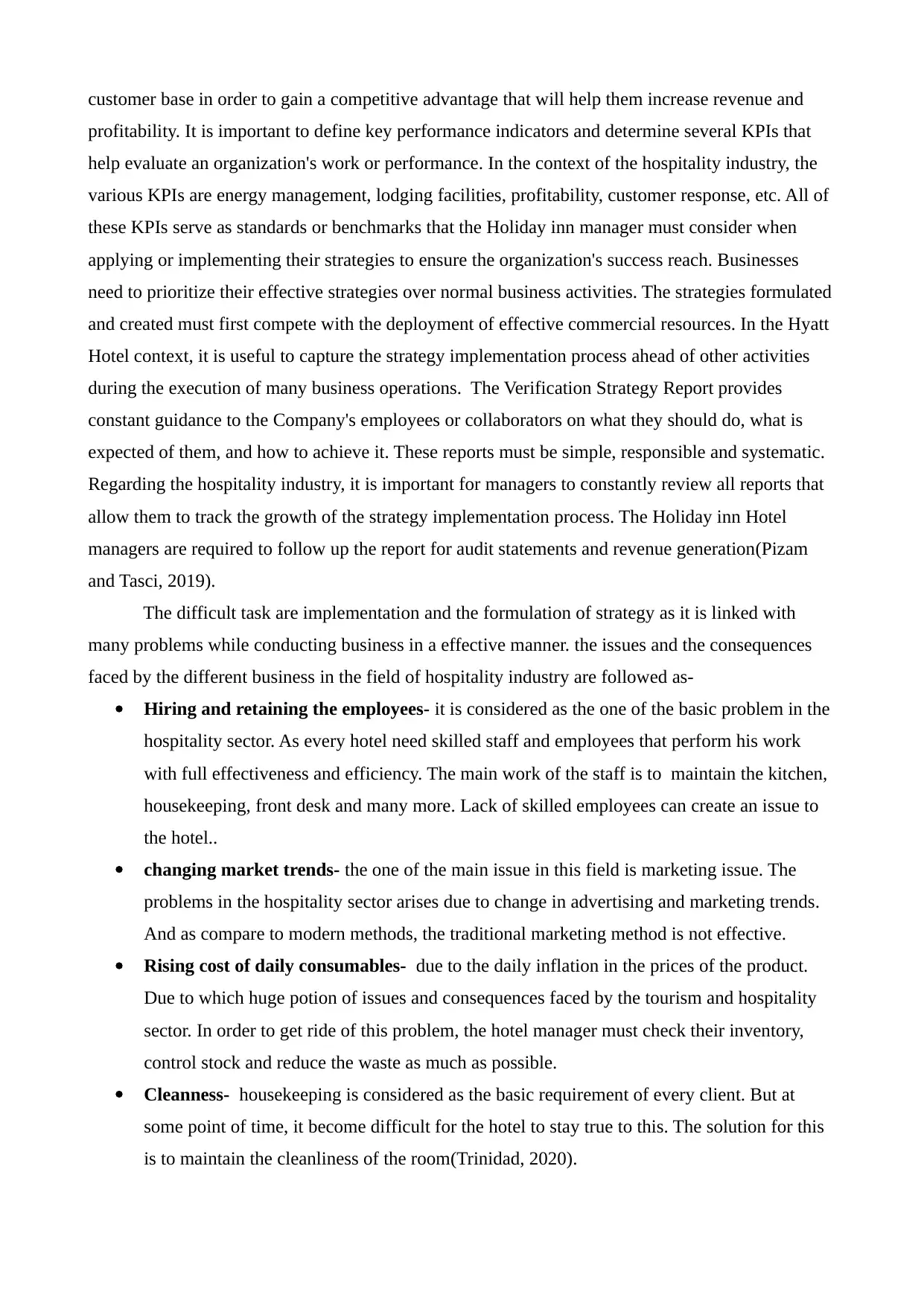
customer base in order to gain a competitive advantage that will help them increase revenue and
profitability. It is important to define key performance indicators and determine several KPIs that
help evaluate an organization's work or performance. In the context of the hospitality industry, the
various KPIs are energy management, lodging facilities, profitability, customer response, etc. All of
these KPIs serve as standards or benchmarks that the Holiday inn manager must consider when
applying or implementing their strategies to ensure the organization's success reach. Businesses
need to prioritize their effective strategies over normal business activities. The strategies formulated
and created must first compete with the deployment of effective commercial resources. In the Hyatt
Hotel context, it is useful to capture the strategy implementation process ahead of other activities
during the execution of many business operations. The Verification Strategy Report provides
constant guidance to the Company's employees or collaborators on what they should do, what is
expected of them, and how to achieve it. These reports must be simple, responsible and systematic.
Regarding the hospitality industry, it is important for managers to constantly review all reports that
allow them to track the growth of the strategy implementation process. The Holiday inn Hotel
managers are required to follow up the report for audit statements and revenue generation(Pizam
and Tasci, 2019).
The difficult task are implementation and the formulation of strategy as it is linked with
many problems while conducting business in a effective manner. the issues and the consequences
faced by the different business in the field of hospitality industry are followed as-
Hiring and retaining the employees- it is considered as the one of the basic problem in the
hospitality sector. As every hotel need skilled staff and employees that perform his work
with full effectiveness and efficiency. The main work of the staff is to maintain the kitchen,
housekeeping, front desk and many more. Lack of skilled employees can create an issue to
the hotel..
changing market trends- the one of the main issue in this field is marketing issue. The
problems in the hospitality sector arises due to change in advertising and marketing trends.
And as compare to modern methods, the traditional marketing method is not effective.
Rising cost of daily consumables- due to the daily inflation in the prices of the product.
Due to which huge potion of issues and consequences faced by the tourism and hospitality
sector. In order to get ride of this problem, the hotel manager must check their inventory,
control stock and reduce the waste as much as possible.
Cleanness- housekeeping is considered as the basic requirement of every client. But at
some point of time, it become difficult for the hotel to stay true to this. The solution for this
is to maintain the cleanliness of the room(Trinidad, 2020).
profitability. It is important to define key performance indicators and determine several KPIs that
help evaluate an organization's work or performance. In the context of the hospitality industry, the
various KPIs are energy management, lodging facilities, profitability, customer response, etc. All of
these KPIs serve as standards or benchmarks that the Holiday inn manager must consider when
applying or implementing their strategies to ensure the organization's success reach. Businesses
need to prioritize their effective strategies over normal business activities. The strategies formulated
and created must first compete with the deployment of effective commercial resources. In the Hyatt
Hotel context, it is useful to capture the strategy implementation process ahead of other activities
during the execution of many business operations. The Verification Strategy Report provides
constant guidance to the Company's employees or collaborators on what they should do, what is
expected of them, and how to achieve it. These reports must be simple, responsible and systematic.
Regarding the hospitality industry, it is important for managers to constantly review all reports that
allow them to track the growth of the strategy implementation process. The Holiday inn Hotel
managers are required to follow up the report for audit statements and revenue generation(Pizam
and Tasci, 2019).
The difficult task are implementation and the formulation of strategy as it is linked with
many problems while conducting business in a effective manner. the issues and the consequences
faced by the different business in the field of hospitality industry are followed as-
Hiring and retaining the employees- it is considered as the one of the basic problem in the
hospitality sector. As every hotel need skilled staff and employees that perform his work
with full effectiveness and efficiency. The main work of the staff is to maintain the kitchen,
housekeeping, front desk and many more. Lack of skilled employees can create an issue to
the hotel..
changing market trends- the one of the main issue in this field is marketing issue. The
problems in the hospitality sector arises due to change in advertising and marketing trends.
And as compare to modern methods, the traditional marketing method is not effective.
Rising cost of daily consumables- due to the daily inflation in the prices of the product.
Due to which huge potion of issues and consequences faced by the tourism and hospitality
sector. In order to get ride of this problem, the hotel manager must check their inventory,
control stock and reduce the waste as much as possible.
Cleanness- housekeeping is considered as the basic requirement of every client. But at
some point of time, it become difficult for the hotel to stay true to this. The solution for this
is to maintain the cleanliness of the room(Trinidad, 2020).
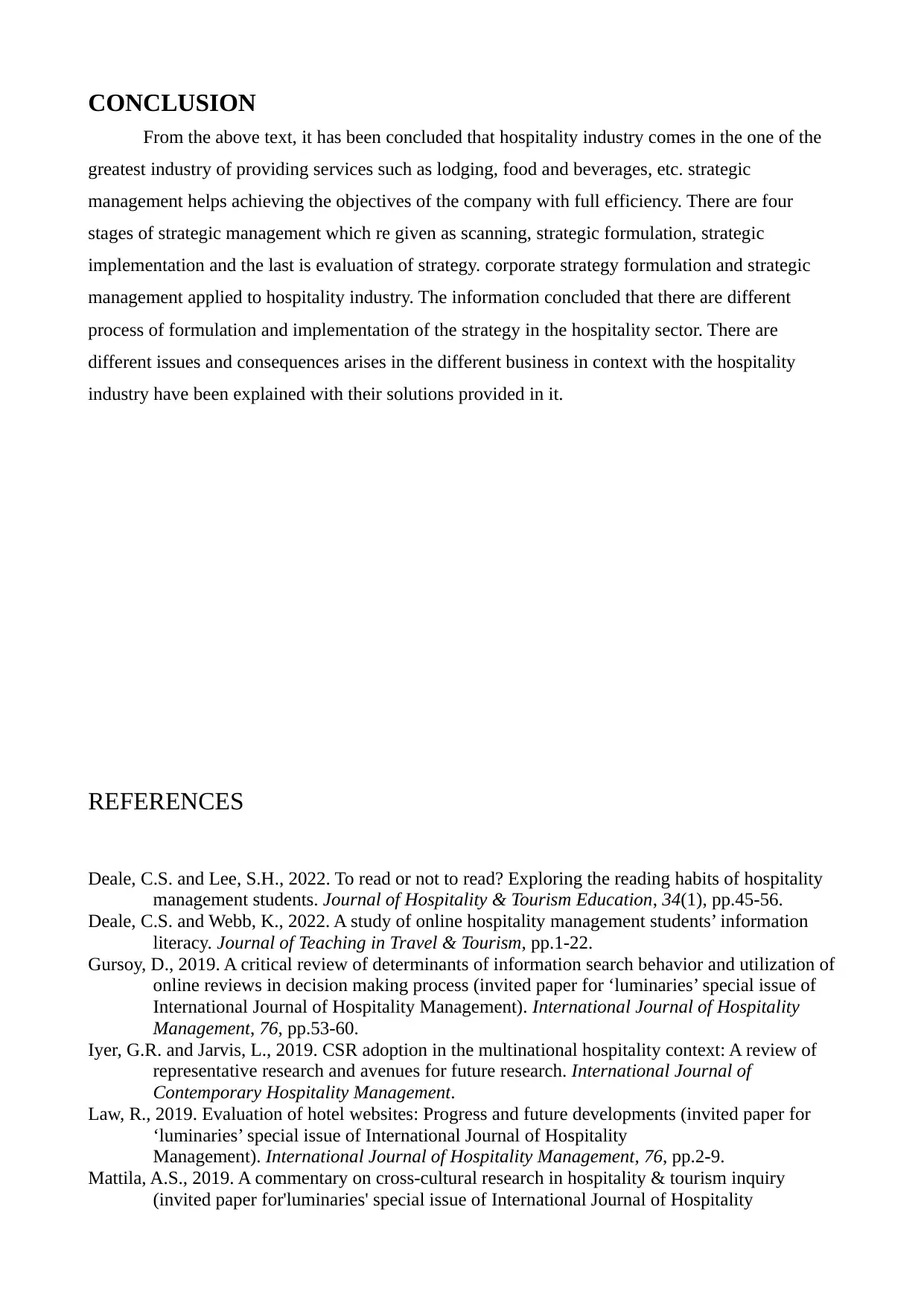
CONCLUSION
From the above text, it has been concluded that hospitality industry comes in the one of the
greatest industry of providing services such as lodging, food and beverages, etc. strategic
management helps achieving the objectives of the company with full efficiency. There are four
stages of strategic management which re given as scanning, strategic formulation, strategic
implementation and the last is evaluation of strategy. corporate strategy formulation and strategic
management applied to hospitality industry. The information concluded that there are different
process of formulation and implementation of the strategy in the hospitality sector. There are
different issues and consequences arises in the different business in context with the hospitality
industry have been explained with their solutions provided in it.
REFERENCES
Deale, C.S. and Lee, S.H., 2022. To read or not to read? Exploring the reading habits of hospitality
management students. Journal of Hospitality & Tourism Education, 34(1), pp.45-56.
Deale, C.S. and Webb, K., 2022. A study of online hospitality management students’ information
literacy. Journal of Teaching in Travel & Tourism, pp.1-22.
Gursoy, D., 2019. A critical review of determinants of information search behavior and utilization of
online reviews in decision making process (invited paper for ‘luminaries’ special issue of
International Journal of Hospitality Management). International Journal of Hospitality
Management, 76, pp.53-60.
Iyer, G.R. and Jarvis, L., 2019. CSR adoption in the multinational hospitality context: A review of
representative research and avenues for future research. International Journal of
Contemporary Hospitality Management.
Law, R., 2019. Evaluation of hotel websites: Progress and future developments (invited paper for
‘luminaries’ special issue of International Journal of Hospitality
Management). International Journal of Hospitality Management, 76, pp.2-9.
Mattila, A.S., 2019. A commentary on cross-cultural research in hospitality & tourism inquiry
(invited paper for'luminaries' special issue of International Journal of Hospitality
From the above text, it has been concluded that hospitality industry comes in the one of the
greatest industry of providing services such as lodging, food and beverages, etc. strategic
management helps achieving the objectives of the company with full efficiency. There are four
stages of strategic management which re given as scanning, strategic formulation, strategic
implementation and the last is evaluation of strategy. corporate strategy formulation and strategic
management applied to hospitality industry. The information concluded that there are different
process of formulation and implementation of the strategy in the hospitality sector. There are
different issues and consequences arises in the different business in context with the hospitality
industry have been explained with their solutions provided in it.
REFERENCES
Deale, C.S. and Lee, S.H., 2022. To read or not to read? Exploring the reading habits of hospitality
management students. Journal of Hospitality & Tourism Education, 34(1), pp.45-56.
Deale, C.S. and Webb, K., 2022. A study of online hospitality management students’ information
literacy. Journal of Teaching in Travel & Tourism, pp.1-22.
Gursoy, D., 2019. A critical review of determinants of information search behavior and utilization of
online reviews in decision making process (invited paper for ‘luminaries’ special issue of
International Journal of Hospitality Management). International Journal of Hospitality
Management, 76, pp.53-60.
Iyer, G.R. and Jarvis, L., 2019. CSR adoption in the multinational hospitality context: A review of
representative research and avenues for future research. International Journal of
Contemporary Hospitality Management.
Law, R., 2019. Evaluation of hotel websites: Progress and future developments (invited paper for
‘luminaries’ special issue of International Journal of Hospitality
Management). International Journal of Hospitality Management, 76, pp.2-9.
Mattila, A.S., 2019. A commentary on cross-cultural research in hospitality & tourism inquiry
(invited paper for'luminaries' special issue of International Journal of Hospitality
⊘ This is a preview!⊘
Do you want full access?
Subscribe today to unlock all pages.

Trusted by 1+ million students worldwide
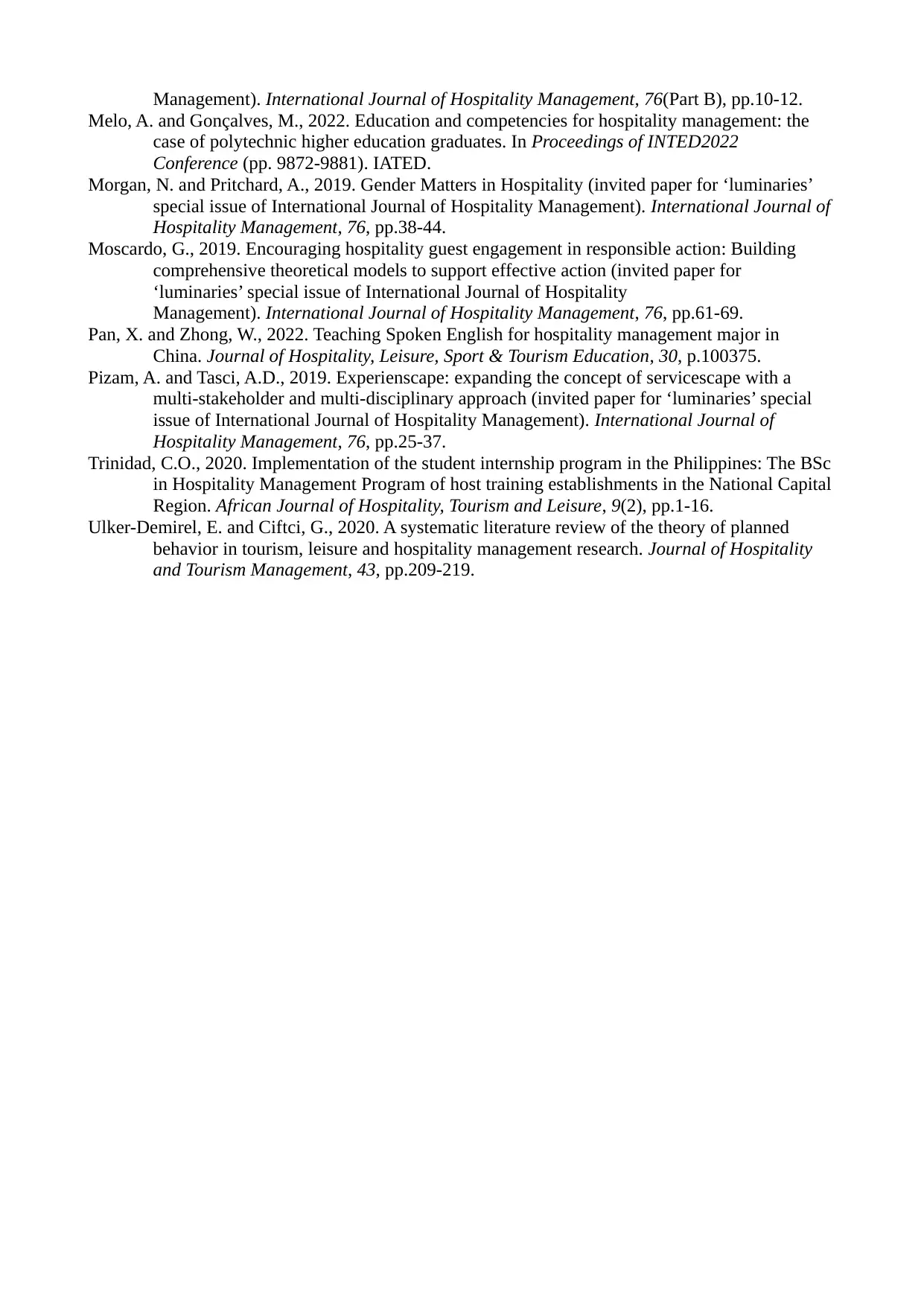
Management). International Journal of Hospitality Management, 76(Part B), pp.10-12.
Melo, A. and Gonçalves, M., 2022. Education and competencies for hospitality management: the
case of polytechnic higher education graduates. In Proceedings of INTED2022
Conference (pp. 9872-9881). IATED.
Morgan, N. and Pritchard, A., 2019. Gender Matters in Hospitality (invited paper for ‘luminaries’
special issue of International Journal of Hospitality Management). International Journal of
Hospitality Management, 76, pp.38-44.
Moscardo, G., 2019. Encouraging hospitality guest engagement in responsible action: Building
comprehensive theoretical models to support effective action (invited paper for
‘luminaries’ special issue of International Journal of Hospitality
Management). International Journal of Hospitality Management, 76, pp.61-69.
Pan, X. and Zhong, W., 2022. Teaching Spoken English for hospitality management major in
China. Journal of Hospitality, Leisure, Sport & Tourism Education, 30, p.100375.
Pizam, A. and Tasci, A.D., 2019. Experienscape: expanding the concept of servicescape with a
multi-stakeholder and multi-disciplinary approach (invited paper for ‘luminaries’ special
issue of International Journal of Hospitality Management). International Journal of
Hospitality Management, 76, pp.25-37.
Trinidad, C.O., 2020. Implementation of the student internship program in the Philippines: The BSc
in Hospitality Management Program of host training establishments in the National Capital
Region. African Journal of Hospitality, Tourism and Leisure, 9(2), pp.1-16.
Ulker-Demirel, E. and Ciftci, G., 2020. A systematic literature review of the theory of planned
behavior in tourism, leisure and hospitality management research. Journal of Hospitality
and Tourism Management, 43, pp.209-219.
Melo, A. and Gonçalves, M., 2022. Education and competencies for hospitality management: the
case of polytechnic higher education graduates. In Proceedings of INTED2022
Conference (pp. 9872-9881). IATED.
Morgan, N. and Pritchard, A., 2019. Gender Matters in Hospitality (invited paper for ‘luminaries’
special issue of International Journal of Hospitality Management). International Journal of
Hospitality Management, 76, pp.38-44.
Moscardo, G., 2019. Encouraging hospitality guest engagement in responsible action: Building
comprehensive theoretical models to support effective action (invited paper for
‘luminaries’ special issue of International Journal of Hospitality
Management). International Journal of Hospitality Management, 76, pp.61-69.
Pan, X. and Zhong, W., 2022. Teaching Spoken English for hospitality management major in
China. Journal of Hospitality, Leisure, Sport & Tourism Education, 30, p.100375.
Pizam, A. and Tasci, A.D., 2019. Experienscape: expanding the concept of servicescape with a
multi-stakeholder and multi-disciplinary approach (invited paper for ‘luminaries’ special
issue of International Journal of Hospitality Management). International Journal of
Hospitality Management, 76, pp.25-37.
Trinidad, C.O., 2020. Implementation of the student internship program in the Philippines: The BSc
in Hospitality Management Program of host training establishments in the National Capital
Region. African Journal of Hospitality, Tourism and Leisure, 9(2), pp.1-16.
Ulker-Demirel, E. and Ciftci, G., 2020. A systematic literature review of the theory of planned
behavior in tourism, leisure and hospitality management research. Journal of Hospitality
and Tourism Management, 43, pp.209-219.
1 out of 10
Related Documents
Your All-in-One AI-Powered Toolkit for Academic Success.
+13062052269
info@desklib.com
Available 24*7 on WhatsApp / Email
![[object Object]](/_next/static/media/star-bottom.7253800d.svg)
Unlock your academic potential
Copyright © 2020–2026 A2Z Services. All Rights Reserved. Developed and managed by ZUCOL.



